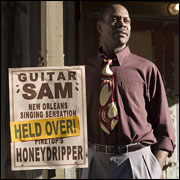Interview: John Sayles of “Honeydripper”
Posted on January 21, 2008 at 8:00 am
 Writer-director-editor-actor John Sayles has made some of the most consistently literate, subtle, and engaging films of the last three decades, including The Secret of Roan Inish
Writer-director-editor-actor John Sayles has made some of the most consistently literate, subtle, and engaging films of the last three decades, including The Secret of Roan Inish, Lone Star
, Casa de los Babys
, Passion Fish
, and Eight Men Out
. I spoke to him about his new movie, “Honeydripper,” the story of Tyrone (Danny Glover), who has a bar in 1950 Harmony, Alabama. His only hope for keeping it going is an appearance by recording star Guitar Sam. When Sam does not show up, Tyrone substitutes a young performer named Sonny, counting on the fact that no one in Harmony has any idea what Guitar Sam looks like.
Would you say there is one theme in your movies, one idea that you like to explore?
The ones that are set in the US, a lot of them are about that tension between the American dream, what we think of as our ideal, and the reality. I like to show people who think they have nothing to do with each other listening to each other. Music is the way people pay attention to each other first, listening to and borrowing from each other’s music, before they are willing to share ideas.
Your last few films have been contemporary. What is different about doing a film set in another time?
Period films are more fun for the art dept. They read a lot of books and look at a lot of pictures, looking at cars, guitars, everything that appears in the film. I am thinking through the characters, how did they think back then, what did they accept, what did they question. This takes place in 1950, before the media started calling it the Civil Rights Movement. Southern towns were not on the alert yet that there was going to be a movement. They were still saying, “We thought all our colored people were happy.” You have to get yourself back into that head. I read autobiographies and biographies, to just get the vibe of the time. It’s within my lifetime, but we’re talking to people who are younger. Our audience is adults who were born years after Martin Luther King was assassinated. He’s somebody on the history channel to them and they do not have that personal experience of how radical he was.
For me the heaviest line in the movie is when the sheriff says “Take your hat off,” not because he’s the sheriff, it’s not a question of his legal authority. It is just because he is white. Unlearning what we know, every character you have to kind of work that equation in. The political activist in the film is the Pullman porter . They were the guys who got around and delivered the message. They had the most radical union. That was the era of A. Philip Randolph.

 Yes, most critics love to read what our colleagues think about movies. And so I spend time just about every day on the wonderful
Yes, most critics love to read what our colleagues think about movies. And so I spend time just about every day on the wonderful  Every other week,
Every other week,